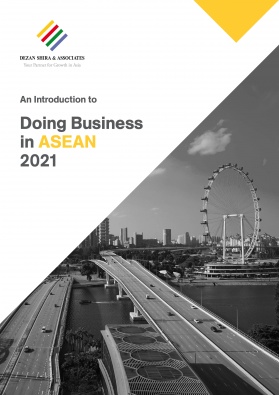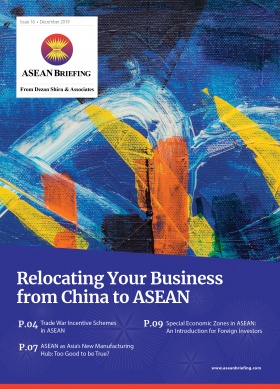Tax Measures Impacting Businesses in Malaysia for 2021
- Malaysia’s government has issued several tax measures in its national budget that will impact businesses in 2021.
- These tax measures are related to the extension of incentives introduced last year to mitigate the economic impact caused by the pandemic.
Malaysia’s government issued a variety of tax measures in its latest national budget that will impact businesses in 2021.
More than 322 billion ringgit (US$79.6 billion) has been allocated for Budget 2021, or 20 percent of GDP, the largest allocation in Malaysia’s history. The tax measures in the budget relate to the extension of incentives, such as tax holidays provided in the stimulus packages introduced throughout 2020 – namely the 2020 Economic Stimulus Package (US$4.8 billion), PRIHATIN (US$57 billion), PRIHATIN for SMEs, and PENJANA (US$8.1 billion). In January 2021, the government issued the PERMAI stimulus package, which was valued at US$3.6 billion.
Malaysia’s GDP is expected to grow between 6.5 and 7.5 percent in 2021, after a contraction of 4.5 percent in 2020 although this is dependent on the successful containment of the virus as well as sustained external demand. Further, the government hopes the impact of these stimulus packages in addition to the incentives provided Budget 2021 will have spillover effects for this year and thus provide an additional boost to the economy.What are the available tax incentives for businesses?
The tax incentives in Budget 2021 are aimed at placing Malaysia at the forefront destination for high value-added services. This includes introducing a preferential corporate income tax (CIT) rate of zero to 10 percent for manufacturers of pharmaceutical products and preferential income tax rates for manufacturers looking to relocate to Malaysia.
Attracting foreign manufacturers
Under the PENJANA stimulus package, foreign companies in the manufacturing sector looking to relocate to Malaysia were given the following incentives, available up to December 31, 2021:
- A zero percent tax rate for 10 years for companies with investments in fixed assets valued between 300 million (US$74.2 million) to 500 million ringgit (US$123.7 million);
- A zero percent tax rate for 15 years for companies with investments in fixed assets valued at over 500 million ringgit (US$123.7 million); and
- A 100 percent investment tax allowance for a company with existing operations in Malaysia that will relocate their overseas facilities into the country.
Through Budget 2021, the tax incentives are to be expanded to businesses in the selected services sector, including those adapting to digitalization and Industrial Revolution 4.0 technology. In addition, the application deadline has been extended.
Such companies, however, must prove they can contribute significantly to the following services:
- The company provides technology-based solutions;
- Provide technology and infrastructure for cloud computing;
- Engage in research and development activities;
- Develop medical devices testing laboratories and clinical trials; and
- Any service or manufacturing-related service determined by the Minister of Finance.
New companies will be eligible to receive a zero to 10 percent income tax rate for up to 10 years whereas an existing company can receive a 10 percent income tax rate for up to 10 years for the new services segment.
Businesses in the manufacturing sector have until December to apply for the aforementioned incentives have until December 31, 2022, to the Malaysian Investment Development Authority (MIDA). For selected businesses in the services sector, the deadline is also December 31, 2022.
Tax incentives for pharmaceutical manufacturers
To encourage manufacturers of pharmaceutical products to invest in Malaysia, the government has offered an income tax rate of between zero to 10 percent for the first 10 years of operations, with a 10 percent tax rate for the next 10 years.
Applications to access these incentives are open until December 31, 2022.
Equity crowd funding
To encourage more investors to invest in equity crowd funding (ECF), the government has offered income tax exemption on 50 percent of the investment amount subject to the following criteria:
- The amount exempted from tax is limited to 50,000 ringgit (US$12,375) for each year of assessment;
- The deductible amount is restricted to 10 percent of aggregate income for each year of assessment;
- The Securities Commission of Malaysia (SC) must verify eligible investor and investee company;
- The investor must not have a family relationship with the investee company;
- Any investment must be made through an ECF platform approved by the SC; and
- The investment must not be disposed of, in full or in part, within two years from the date of the investment.
The Global Trading Center incentive
As part of the government’s strategy to attract companies to establish their regional trading hubs in Malaysia, the budget introduces a new Global Trading Center tax incentive through which businesses are eligible for a concessionary tax rate of 10 percent for a period of five years. This will be renewable for another five years.
The government hopes this will improve Malaysia’s competitiveness, especially among its neighbors. Singapore notably has a Global Trader Program (GTP) to facilitate international trading facilities in the country. The GTP provides a reduced CIT rate of five percent or 10 percent on qualifying income for three or five years.
Applications are open until December 31, 2022.
Extension of tax incentive for principal hub
The government has extended the principal hub incentive, which expired on December 31, 2020, to December 31, 2022. Further, the conditions to qualify for the five-year extension for the incentive (related to the number of high-value jobs, annual expenditure, and the number of key positions) have been relaxed.
In 2015, the government introduced the principal hub incentive to compel multinational companies to locate their regional principal hub in the country’s major cities.
Thus, businesses willing to make Malaysia their center to conduct business for the purpose of management, commerce, finance, and strategic business activities, among others, would qualify for the principal hub incentive.
Qualified businesses are categorized into two groups: new companies or existing companies.
Businesses classified as new companies are further filtered into two tiers:
- Tier 1 — businesses are eligible for a zero percent income tax rate for a period of five years, which is renewable for another five years. To renew, companies need to fulfill the following criteria:
-
- Employ at least 50 high-value workers;
- Employ at least five personnel in key positions; and
- Have an annual operational expenditure of at least 10 million ringgit (US$2.4 million).
- Tier 2 — businesses are eligible for a five percent income tax rate also for a period of five years and this is renewable for another five years. To renew, companies need to fulfill the following criteria:
-
- Employ at least 30 high-value workers;
- Employ at least four personnel for key positions; and
- Have an annual operational expenditure of at least 5 million ringgit (US$1.2 million).
Businesses classified as existing companies are eligible for a 10 percent income tax rate for a period of five years subject to the following criteria:
- Employ at least 30 high-value workers;
- Employ at least five personnel in key positions; and
- Have an annual operational expenditure of at least 10 million ringgit (US$2.4 million).
Extension of tax incentives in the investment corridors
The government has extended the tax incentives for businesses located in several of the country’s investment corridors (a type of SEZ).
The tax incentive period for the East Economic Region (ECER) investment corridor has been extended until 2022. The core objective of the ECER is to boost development and attract investments in the following sectors:
- Oil, gas, and petrochemicals;
- Tourism;
- Manufacturing;
- Human resource development; and
- Agribusiness
In addition to the ECER, the tax incentives provided in the Iskandar Malaysia (IM) and the Sabah Development Corridor (SDC) investment corridors have also been extended until 2022.
Incentives for the commercialization of research and development
The government will provide a 100 percent income tax exemption of statutory income for 10 years to investor companies that commercialize the research and development (R&D) findings of public research institutions.
This has now been expanded to include the commercialization of non-resourced based R&D findings in addition to the commercialization of R&D by private research institutions.
Export of private healthcare services
Private healthcare companies are currently eligible for income tax exemption for income derived from providing healthcare services to either foreign patients in Malaysia or from Malaysia. This incentive has been extended until the end of 2022.
The tax exemption is equivalent to 100 percent of the value of increased export services to be set-off against 70 percent of statutory income.
They must meet the following conditions:
- At least 10 percent of the total number of patients is comprised of qualified healthcare travelers; and
- At least 10 percent of the healthcare provider’s gross income is derived from qualified healthcare travelers.
About Us
ASEAN Briefing is produced by Dezan Shira & Associates. The firm assists foreign investors throughout Asia and maintains offices throughout ASEAN, including in Singapore, Hanoi, Ho Chi Minh City, and Da Nang in Vietnam, Munich, and Esen in Germany, Boston, and Salt Lake City in the United States, Milan, Conegliano, and Udine in Italy, in addition to Jakarta, and Batam in Indonesia. We also have partner firms in Malaysia, Bangladesh, the Philippines, and Thailand as well as our practices in China and India. Please contact us at asia@dezshira.com or visit our website at www.dezshira.com.








